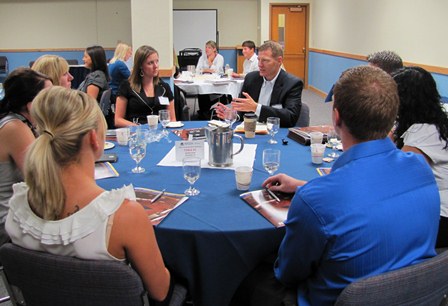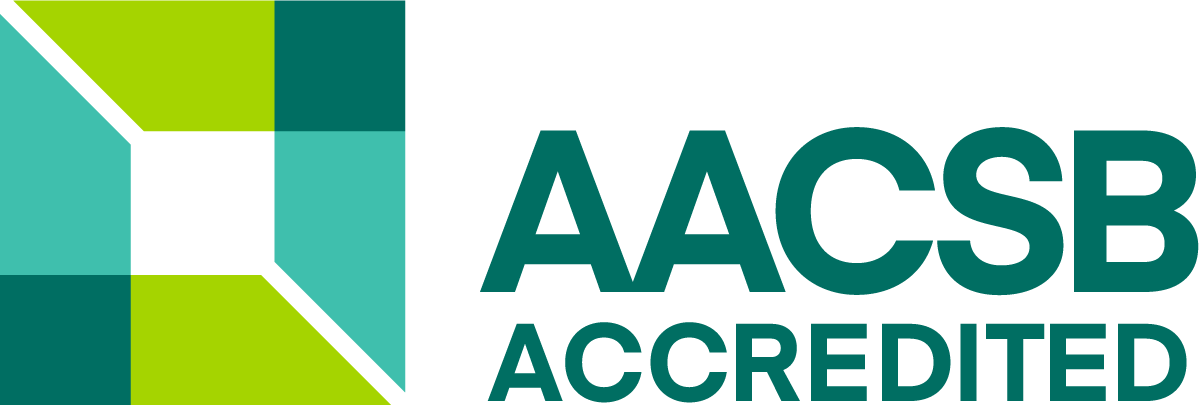MPAc Professional Workshop Resonates with Students
 College of Business faculty in the Master of Professional Accountancy (MPAc) program
and the MSU Accounting Advisory Council held the first MPAc Professionalism Workshop
for all 39 MPAc graduate students during the second week of the fall 2011 semester.
This daylong workshop, held at MSU, was designed to help students better understand
the business of accounting and to identify ways to further develop their interpersonal
and business social skills.
College of Business faculty in the Master of Professional Accountancy (MPAc) program
and the MSU Accounting Advisory Council held the first MPAc Professionalism Workshop
for all 39 MPAc graduate students during the second week of the fall 2011 semester.
This daylong workshop, held at MSU, was designed to help students better understand
the business of accounting and to identify ways to further develop their interpersonal
and business social skills.
“We really wanted to create an opportunity for our Accounting Advisory Council members to interact with MPAc students, to share their knowledge and experience, and to give students the opportunity to ask questions and participate in conversations with high-level accounting professionals,” said Christie Johnson, accounting professor, Accounting Advisory Council executive secretary and workshop organizer. “This workshop evolved from many discussions between MPAc faculty and Council members that identified ways the Council might have a meaningful impact on students.”
The workshop’s morning sessions included an Advisory Council panel discussion focused on helping students understand the profession of accounting. The panel stressed the most important points students should know about how junior-level accountants add value to their companies, beyond their excellent technical skills. The discussion highlighted the types of communication and social skills needed to help ensure success and avoid common shortcomings during their first two years of work.
“I really enjoyed the entire workshop, but the panel discussion was my favorite part,” said Samantha Mahlen, a graduate student in the MPAc program. “It was really great to ask questions of the panel, such as ‘What do you look for in a new hire?’ and ‘What do you expect from a junior associate?’ and to receive such candid, thoughtful answers from accomplished accounting professionals.”
Additional workshop session topics included how to lead with emotional intelligence; how to present oneself in an interview, which included a mock interview between a Council member and a faculty member; and information on College of Business programs and events including the Executive’s Closet and fall recruiting opportunities. Students then signed up to participate in mock interviews or student resume reviews to close out the workshop’s offerings.
“Participating in this conference was very meaningful to me,” said Scott Holton, CPA and Partner with Rudd & Company. “Our greatest asset to offer this group of students, as Advisory Council members, was in helping them realize what it’s really going to be like out there in the business world and help prepare them to succeed.”
During lunch, students were reseated at assigned tables, where they participated in conversations with Council members about professional issues and topics of current interest. The mealtime conversations gave Council members the opportunity to model effective communication skills and helped students identify strategies to improve their ability to carry on effective conversations in small group settings.
“We all find ourselves in situations where there’s a lull in the conversation, when there’s an awkward pause,” said Holton. “I have developed a canned set of questions that I have ready to ask someone when these situations arise, to help fill the gap and get the conversation going again, and I encourage students to do the same. A little bit of preparation can go a long way towards ensuring a smooth flow of conversation.”
In the afternoon, students watched Holton and accounting professor Angela Woodland participate in a mock interview as a way to begin a discussion, moderated by accounting professor Marc Giullian, about how students should present themselves in an interview situation. Business students often hold internships prior to full-time employment, and strong interviewing skills can make the difference in landing that coveted full-time career position.
“The mock interview gave students a visual aid that helped begin the discussion,” explained Angela Woodland, accounting professor, panel facilitator and mock interviewee. “Students asked questions about posture, tone of voice, the content of responses, clothing choices and so many things that involved both body language and presenting oneself in a professional manner.”
All of these components that went into the MPAc Professionalism Workshop - from the panel discussion and mock interviews to the mealtime seating assignments - were selected by workshop organizers with a clear purpose and intent that reflects a strong commitment to student success. This workshop is one example of how the College of Business is focused on helping students further develop their interpersonal communication skills, improve their professionalism, identify areas they need to improve, and practice interacting with business professionals in a business environment.
“I think the MPAc program is awesome,” said Samantha Mahlen. “The College of Business provides students with a smaller, accessible atmosphere within a bigger academic setting. All the professors in the College have been really helpful in making sure we, as students, get what we need to succeed. I recognize and appreciate how much work went into making this workshop a meaningful experience for all of us.”

